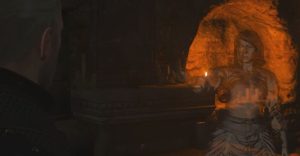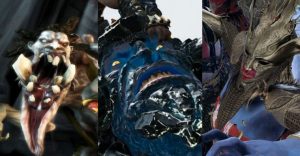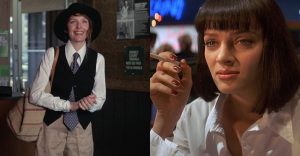House Of Gucci Ending & Real Meaning Explained

Ridley Scott’s latest movie is based on a true story, but House of Gucci‘s ending has a lot more to say about power and love than it appears. Scott’s second movie of the year after October’s The Last Duel, House of Gucci features a star-studded cast with Lady Gaga playing Patrizia Reggiani, the future wife of Maurizio Gucci, played by Adam Driver. Maurizio is heir to the Gucci name, although he doesn’t want to cash in on the family’s business much to his father Rodolfo’s consternation. This prompts him to marry Patrizia in a fit of rebellion resulting in his temporary ex-communication from the family.
This ostracism doesn’t sit well with Patrizia, who is both attracted to Maurizio’s charms and looks, as well as his proximity to power and wealth. Patrizia looks to find a way back into the Gucci empire and it is through this that audiences are introduced to the rest of House of Gucci‘s cast. In addition to Jeremy Irons’ Rodolfo, the film also stars an unrecognizable Jared Leto as Paolo Gucci, Maurizio’s cousin, and Al Pacino as Aldo Gucci, Maurizio’s uncle. Salma Hayek also stars as Pina Auriemma, a close confidante of Patrizia’s and an eventual accomplice in her crimes.
House of Gucci‘s promotional materials have not shied away from the fact that Patrizia eventually hires someone to kill Maurizio, but it’s how she gets there that is the most interesting part of the story. Lady Gaga’s gonzo performance as the Italian matriarch is infused with both Lady Macbeth-esque ambition and Grecian tragedy in equal measure, as is the entire family on which House of Gucci is based. Despite knowing where the film is going, though, Scott weaves an intricate tale about wealth, power, and the fashion industry that is much more complex than it seems. Here’s what happens at the end of House of Gucci and what it means.
House Of Gucci Is Really About Power

While the plot of House of Gucci is centered around the romance between Patrizia and Maurizio, the film itself is more about power. Control of the Gucci company is a constant topic of conversation throughout the film—between brothers Aldo and Rodolfo and eventually between Patrizia and Maurizio. Initially, House of Gucci follows the conflict between Rodolfo and Aldo’s differing interests, with Aldo wanting to commercialize Gucci and Rodolfo wanting to keep it a more exclusive, high-end business.
With both Patrizia and Maurizio out of the picture at the time, Al Pacino’s Aldo ultimately wins out over Rodolfo as the elder sibling is more occupied with his declining health. If anything, though, Patrizia sees this as a prime opportunity to convince Maurizio to get back into the company and this begins their constant battle for power in the couple’s increasingly complicated marriage.
House of Gucci features the couple sparring back and forth for power. Patrizia is constantly trying to get Maurizio to be more involved in the family business and this grants her everything she’s ever wanted, including wealth, power, and status. She even feels brave enough to speak out against the Gucci fakes being sold on the streets of New York, finding out that those are actually sanctioned by the company. Eventually, though, Maurizio himself is consumed by the very power he rejected and Adam Driver’s character strips Patrizia of everything she has worked for.
Why Patrizia Really Killed Maurizio

House of Gucci paints Patrizia’s murder of Maurizio as a crime of passion, but it’s actually a lot more complicated than that. Maurizio’s spurning of Patrizia is certainly a motivating factor and it doesn’t help that Driver’s character openly flaunts his newfound power (and lover) in Patrizia’s face. Lady Gaga’s character is clearly a romantic and those things shouldn’t be taken lightly. From the beginning, Patrizia’s fascination with Maurizio is clearly concerned with both his wealth and power and his inherent attractiveness in terms of how he ignores this wealth and power.
As with any classic true-crime tale, though, the murder of Maurizio Gucci involves multiple factors. Patrizia kills Maurizio because she is shut out of the power his status has gained her. Although he is hesitant at first to join Gucci and use his legal smarts for the company’s gain, once he does, Maurizio becomes as engrossed in the machinations of the fashion empire as Aldo and Rodolfo before him. In fact, he becomes so entrenched in it that he begins to see Patrizia as another threat rather than the wife he once loved.
With Patrizia so used to having power, once she is stripped of that, it’s clear that her anger overtakes her. Lady Gaga expertly communicates the complicated emotions Patrizia feels—not only is she a spurned lover, but she is also a woman whose agency has been taken from her. In any society, but especially traditional Italian society where the roles of women in the family align with outdated gender norms, Patrizia being put back into that role only serves to heighten her anger.
What Happened To Real-Life House Of Gucci Characters

After the events of House of Gucci, which culminates in the murder of Maurizio, Patrizia Reggiani is sentenced to 29 years in prison. During her time behind bars, the real-life Patrizia attempted to commit suicide but lived through it. Eventually, after serving 18 years in prison, she was released in October 2016. Jared Leto’s character Paolo died just a few short months after the death of Maurizio while his father, Aldo, died five years earlier in 1990. Salma Hayek’s Pina was released from prison in 2010, six years before Patrizia. At this time, there are no members of the Gucci family who currently work for the company.
Related: Winter 2021 Movie Preview: Every Movie Still To Come (And Where To Watch Them)
How Much Of House Of Gucci Really Happened

For the most part, House of Gucci is extremely accurate. As with any movies depicting real-life events, the conversations had within are up for interpretation, which means that many of the interactions featured in the film are more than likely off from how things played out in real life. Still, Ridley Scott’s painstaking attention to historical detail is clear in the film, from the obviously important fashion elements, down to specific events and how they transpired. Members of the Gucci family have spoken out about the movie, but this could also be because the film shines a light on a time that the family would most likely like to forget—something that House of Gucci‘s ending makes clear.
About The Author


















